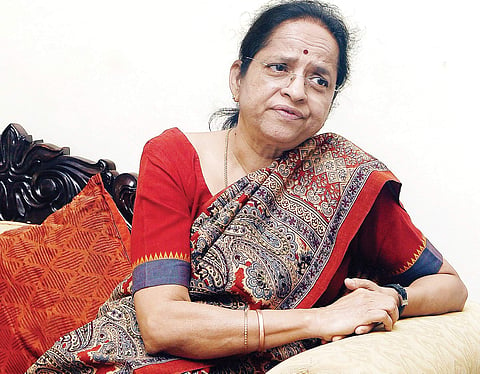

CHENNAI: When Dr Lakshmi Vijayakumar started practising psychiatry, her vision about what the future would hold was dismal. At a time where the probability of treating and curing mental illness was low due to lack of proper medication and awareness, she shifted her focus to something that could be achieved, but nobody was looking at — suicide prevention.
She presented a paper in 1983 at the International Association for Suicide Prevention Conference, Vienna, on the risk factors of suicide. Her life changed after that, and in 1986, she founded Sneha, a voluntary suicide prevention organisation. Thirty-one years and several accolades later, Lakshmi has been conferred with yet another honour — Fellow of the Royal College of Physicians (FRCP Edin) by The Royal College of Physicians, Edinburgh, UK.
“This is definitely an honour. Every year, the college gives the FRCP to physicians and it’s very unusual for them to give it to a psychiatrist,” she says and recalls her surprise when she received the mail. “I was overwhelmed and later found out that the president of the World Psychiatric Association had recommended my name, seconded by the Royal College of Psychiatrists (FRCPsych), UK,” shares Lakshmi who is the first and only Indian psychiatrist who has been conferred both the FRCP (E) and the Honorary Fellowship of the Royal College of Psychiatrists (2009).
“I was doing psychiatry at that time when the picture was extremely depressing. What one reads about suicide in text books was not reality.” Seeing young women committing suicide pushed her to present the paper on the real risk factors of suicide. “After the event, I had the opportunity of visiting suicide prevention centres in Vienna and London. I was impressed with their system and wanted to start one in Chennai,” she adds.
But, starting a volunteer-manned organisation was not easy. “Thirty years back, such an idea was unheard of. Many turned it down thinking it was not feasible. But I felt suicide was not just a mental health issue... it was also a social problem. If the society wasn’t involved, I knew we couldn’t find a way,” she shares.
Questions like ‘Madras is a conservative city, how will people open up, how can you prevent suicide by simply talking, and how can the organisation sustain with just volunteers’, were raised.
“Today, I can proudly say that Sneha worked every single day for the last 31 years, except one day during the 2015 floods. Thanks to the volunteers who man our phone and mail 24x7,” she beams talking about the crisis line that has received more than 3 lakh calls since its inception.
Listening to gut-wrenching stories of strangers is difficult. “There was a time when I spoke to an educated young man who couldn’t find a job and was starving for three days. After that, I went to a friend’s birthday which had a lavish spread and I couldn’t eat…the image of the young man flashed in front of me. It affects you…but you need to find the balance,” she says.
Lakshmi avers that a national intervention strategy is the need of the hour. “As of now it’s all in paper…but it needs to be implemented by the Government at the earliest,” she says. We ask the author of over 100 articles in peer-reviewed journals if she would ever write a book about her experiences. “Well, my experiences are aplenty and I would like to pen it. But I am better off writing technical and scientific books,” she laughs.
Movie idea
Lakshmi recalls an incident that took place after the release of late director K Balachander’s Ek Duje Ke Liye. “I went to invite him to chair an event and he said he couldn’t…he had been receiving letters that people wanted to commit suicide the same way he had portrayed in the movie. He said he felt guilty. I asked him to take a movie that shows the thought of suicide in a positive light — to go through struggle, but overcome it and realise that life is worth living,” she says. And KB made Vaaname Ellai (1992).
Interventions
Actively taking part in suicide interventions in several segments of the society, she talks about exam failure. “Through a study, we found that students who failed and committed suicide were in two categories — those who failed by a margin of a few marks and the others who aimed for more and got less. So, we campaigned and gave a memorandum saying that 50% of students had failed in only one or two subjects. After which, ours became the first Government to introduce supplementary exams in 2003,” she smiles. Since then the ‘exam failure suicides’ have considerably gone down — from 45 in Chennai to nine. She has also been instrumental in reducing the number of pesticide suicides by farmers by keeping pesticides in lockers, which was recognised as the most effective intervention by WHO.